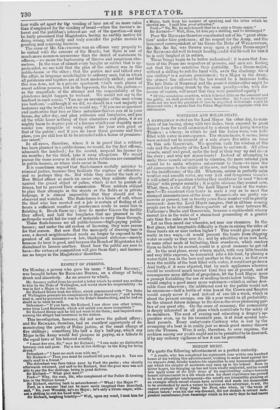RESPECT OF PERSONS.
ON Monday, a person who gave his 'name " Edward Savoury," was brought before Sir RICHARD BIRNIE, on a charge of being drunk and disorderly. As an answer to which,
Mr. Savoury pulled from his pocket a letter which he stated was written to him by the Duke of Wellington, and would show his respectability : he was in fact a Major in the Army.
Sir Richard Birnie took the letter, which commenced with " The Duke of Wellington presents his compliments to Major Savoury ;" and having read it, said he perceived it was in the Duke's handwriting, and he had no doubt as to what he said.
Defendant—" If you have, Sir Richard, I can show you other letters, some from Lord Bentinck, which will satisfy you more completely." Sir Richard Birnie said he did not want to see them; and inquired con- cerning the alleged bad treatment in the station.
This investigation, however, did not serve the gallant officer; and Sir RICHARD, therefore, had an excellent opportunity of de- monstrating the purity of Police justice, at the small charge of five shillings ; something like half a day's half-pay, which any Major in the Army would feel plea§ure in paying, as a tribute to the equal laws of his beloved country.
" I must fine you, Sir," says Sir Richard ; " I can make no distinction between rich and poor. Pay a fine of five shillings to the King for being drunk."
Defendant—" T have no such sum with me."
Sir Richard—" Then you must be confined till you do pay it. You can easily send to a friend." The defendant was then taken away by Ford the gaoler ; who shortly afterwards returned, and said to Sir Richard, that the poor man was not able to pay the five shillings, being in great distress. Sir Richard—" What poor man ?" Ford—" Why, the man, Sir, who complained of the Police ill-treating him in the Station-house."
Sir Richard, starting back in astonishment—" What I the Major ?" Ford, in a manner that can be more easily imagined than described, said, " No, your Worship, he's no Major; he's only a Drum-major, with- out a shilling to rub his band with." Sir Richard, laughing heartily—" Well, upon my word, I took him for
a Major, both from his manner of speaking and the letter which he showed me. I paid him great attention."
Ford—" No, Sir, he says himself that he is only a Drum-major." Sir Richard—" Well, then, let him pay a shilling, and be discharged."
Poor Sir RICHARD therefore was cheated out of his " great atten- tion" under false pretences ; all his respect for the Army, and the honoured correspondent of his Grace the Duke of WELLINGTON, &c. &c. &c &c. was thrown away upon a paltry Drum-major! Sir RICHARD did well to laugh heartily, and it will be well for hint if he is only laughed at in return. These things begin to be better understood : it is seen that Jus- tices of the Peace are respecters of persons, and men are finding out that the law sanctions their partiality. To a Drum-major, without a shilling to rub his hand with, even the discharge fee of one shilling* is a serious punishment ; to a Major in the Army, the utmost fine allowed by the law would be a ludicrous trifle. The late Duke of NORFOLK and the poorest cinder-sifter might be punished for getting drunk by the same penalty—who, with dis- course of reason, will assert that they were punished equally ?
* Of this scandalous exaction, which is levied alike on the innocent and the guilty, we shall probably say more hereafter. Sir JAMES SCARLETT could not see how the payment of fees by acquitted defendants could be dispensed with ; it seems that the Police Magistrates sympathize with his obtuseness.


























 Previous page
Previous page